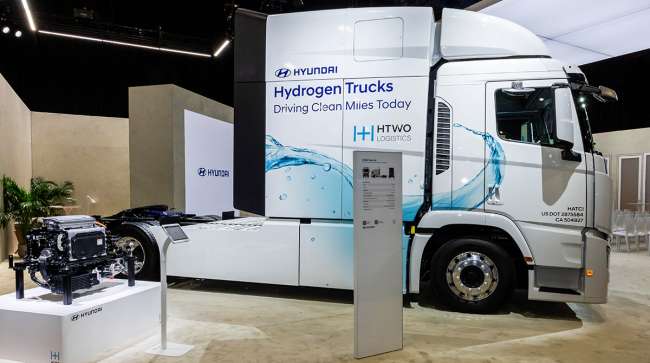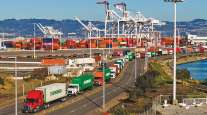Bloomberg News
Hyundai Testing Novel Hydrogen Production

[Stay on top of transportation news: Get TTNews in your inbox.]
Hyundai Motor Co.’s plant in Georgia has been running its internal logistics operations using hydrogen and the South Korean automaker has been testing domestic production of the fuel using biogas from food scraps as part of its push to build a sustainable energy future around the gas.
The company’s so-called Metaplant facility, which makes electric vehicles and batteries, is using hydrogen fuel cell trucks, whose energy density “has the ability to have less range anxiety because you can go a greater distance,” Jim Park, Hyundai’s head of commercial vehicles and hydrogen business development for North America, said.
Hyundai has pledged to invest some 5.7 trillion won ($4.1 billion) over the next decade to build a future around hydrogen, looking beyond car manufacturing to meet its own climate goals and accelerate the world’s green transition. The company has said it aims to achieve net zero by 2045 and become carbon neutral across all stages of production and operation.
“When it comes to hydrogen, it’s really an end-to-end solution from transporting, storing, dispensing and then utilization,” Park said in an interview ahead of the Bloomberg New Economy forum in Sao Paulo. “We look at the full spectrum of the hydrogen economy.”
National Hydrogen Day 2024: Driving change with our XCIENT Heavy-Duty Fuel Cell Truck. Powering fleets with zero emissions and a cleaner future. 🌏 🌱 pic.twitter.com/HSYeLRExYn — Hyundai USA (@Hyundai) October 8, 2024
As the global car industry shifts away from fossil fuels, Hyundai has gone big on touting hydrogen as a carbon-free alternative, one that can be produced by carbon capture or electrolysis of water powered by renewable energy. Hyundai sees hydrogen playing a key role in the commercial vehicle sector because its higher storage density offers an advantage both in weight and range versus battery-powered vehicles, Park said.
Under its hydrogen business brand HTWO, Hyundai plans to expand the use of the technology to trains, advanced air mobility applications and sea vessels, he added.
Want more news? Listen to today's daily briefing above or go here for more info
But while hydrogen offers faster refueling and a longer range, the absence of refueling infrastructure and mass-market applications will make wider adoption a slim prospect at least in the near term. To that end, Hyundai has been cooperating with governments to address the issue, including taking part in a $7 billion hydrogen project in the U.S. to accelerate the deployment of infrastructure, Park said.
Asked about the upcoming U.S. elections — Donald Trump has expressed his dislike of hydrogen-powered cars, suggesting they can explode — Park acknowledged the former president’s remarks but said “we think hydrogen should be agnostic on either side of the aisle. It’s a real clean energy that offers many solutions.”




